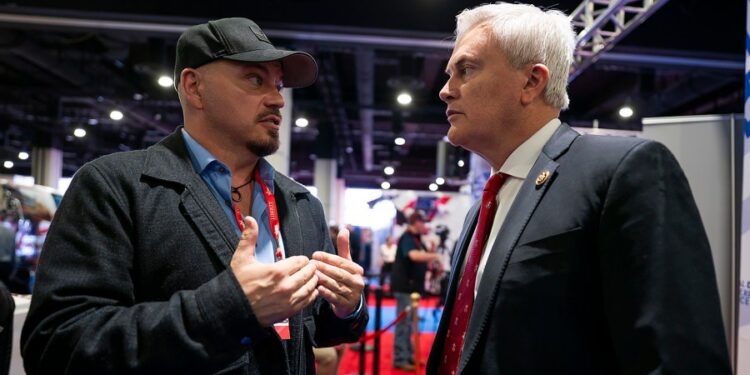
NATIONAL HARBOR, Md. — Individuals pardoned by President Trump over their involvement in the Jan. 6 Capitol riot are off-stage stars at the Conservative Political Action Conference (CPAC) this year.
More than a dozen of the “J6ers” are in attendance at the gathering of conservatives, and they are being treated like war heroes.
A group of them were interviewed live for former Trump adviser Steve Bannon’s “War Room” show in the CPAC exhibition complex. Some of them participated in a live team quiz show against another team of CPAC attendees. Many got stopped for selfies by other CPAC attendees, or just to chat.
“We became celebrities here. It’s weird,” said Brian Mock, one of the roughly 1,500 people whom Trump pardoned in connection with Jan. 6.
“We used to be really the most hated people in America. And now, you know, we’re getting recognized at church and get a standing ovation at church,” Mock said.
Mock, 46, was convicted of six felonies and five misdemeanors, including assaulting, resisting, or impeding officers — which he maintains was the result of an unfair trial, after enduring harsh conditions in jail.
Also at CPAC being greeted by numerous attendees was Stewart Rhodes, the founder of the Oath Keepers who was convicted of seditious conspiracy. Rhodes was one of 14 people who got a commutation rather than a full pardon from Trump in relation to Jan. 6.
Controversy bubbled up around the J6ers Wednesday night as attendees picked up badges. A number of those who received pardons and commutations said they were turned away and left — prompting outrage from some on the right and their supporters.
CPAC on Thursday morning disputed that people were turned away because of Jan. 6, posting a statement on social platform X: “It is untrue that we are not allowing people to come to CPAC because of their involvement with J6. In fact, CPAC has been a constant supporter of this persecuted community and we support wholeheartedly President Trump’s pardons of the J6 victims. The registration link is active and tickets will be sold out very soon.”
One of those who had an issue Wednesday night was Rhodes. But on Thursday, the Oath Keepers founder got his pass and red lanyard granting him full run of CPAC.
“I’m going to take them at face value that there was some kind of an error that someone in the staff made that wasn’t fully approved,” Rhodes told The Hill.
The coalescing of Jan. 6 defendants at CPAC is part spontaneous, part organized by the close network of other Jan. 6 defendants. Mock said he has driven around the country to talk to other J6ers in recent weeks to get their stories out. Some have donation funds that paid for their tickets.
“We’re like family for the rest of our lives. We support each other,” said Gabriel Garcia, a former member of the Proud Boys and a retired Army captain who was convicted of obstruction of law enforcement and obstruction of an official proceeding.
Garcia gave interviews Thursday morning on CPAC’s media row, wearing a bright orange shirt that said “political prisoner” and displaying a prop copy of his pardon paperwork.
While some of the reasoning for attending CPAC is social, they also have more goals despite having secured pardons and commutations.
Rhodes is now a national spokesperson for Condemned USA, a legal advocacy group that focused heavily on Jan. 6 defendants, and is representing the organization at CPAC. Many of them are interested in getting in touch with the announced House Judiciary Select Subcommittee on Jan. 6, which will be chaired by Rep. Barry Loudermilk (R-Ga.).
They’re also interested in getting in touch with other lawmakers. Mock caught House Oversight and Government Reform Committee Chair James Comer (R-Ky.) just after the congressman completed an interview, talking to him about Jan. 6 issues.
For 26-year-old Salvador Sandoval Jr. — who was convicted on four counts of assaulting officers among other counts before being released on Jan. 20 as a result of the pardon — the hero’s welcome at CPAC is both strange and welcomed.
“It’s vindicating. We’ve been demonized for so long,” Sandoval said. “I guess they trust Trump enough that when they pardon us, for the most part — maybe they’re second questioning. ‘Maybe they were screwed over. Maybe they didn’t do anything wrong or didn’t deserve to be in prison for so long.’”







